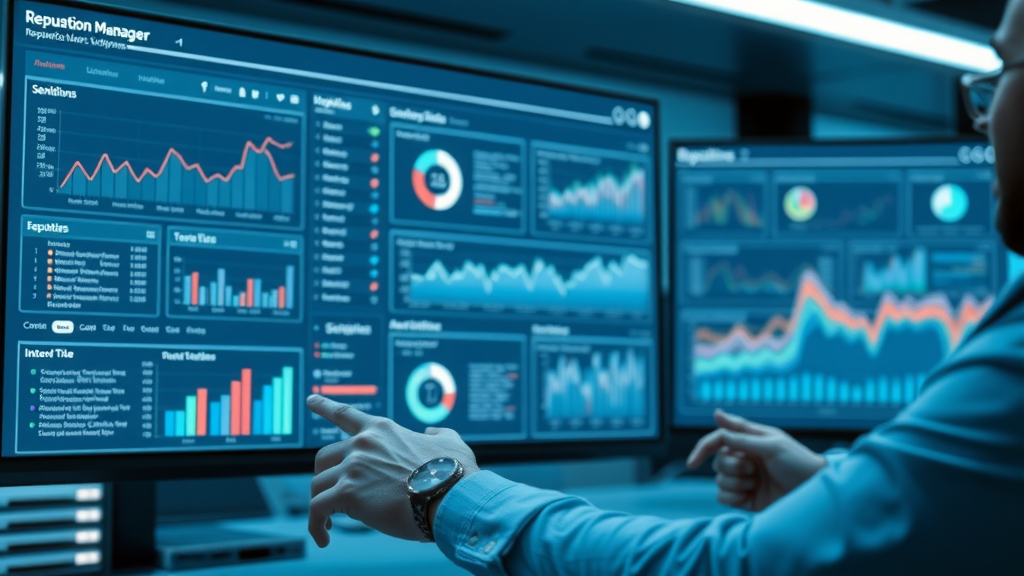Did you know that 97% of consumers use the internet to find local businesses , and more than 85% trust online reviews as much as recommendations from friends and family? Protecting your business from negative online feedback isn’t just a best practice—it’s critical to long-term success. In this guide, you’ll discover how business reputation monitoring can catch brewing problems before they grow, boost your brand reputation, and fuel meaningful growth in any industry. Read on to master techniques the pros use for brand resilience and reputation management.
Business Reputation Monitoring: Why Every Business Needs to Watch Their Reputation

- Did you know that 97% of consumers use the internet to find local businesses, and over 85% trust online reviews as much as personal recommendations? Effective business reputation monitoring is more critical than ever to prevent minor issues from evolving into full-blown crises.
Business reputation monitoring is no longer optional in today’s always-connected world. With every online review, social media mention, or customer comment, your brand reputation is being built—or, just as easily, threatened. Even the smallest oversight can quickly snowball when left unchecked on review sites and across social media platforms. This is why it’s essential for businesses of all sizes to keep a close eye on what people are saying about them online.
From potential customers browsing your latest reviews to existing clients sharing feedback on customer service, every impression matters. If you think business reputation monitoring is just for big brands, think again—local businesses, startups, and global enterprises alike benefit from actively managing their online presence. Not only does it help prevent negative reviews from damaging your credibility, but it also lets you spot growth opportunities, refine your customer experience, and maintain a positive public perception . The earlier you spot a problem, the faster you can respond—protecting your brand from unnecessary setbacks.
Understanding Business Reputation Monitoring: Definitions and Key Concepts
- Defining business reputation monitoring within the broader context of reputation management
- Differentiating online rep and online reputation strategies
- The role of online reputation management tools and software
- Importance of real time monitoring and crisis management
At its core, business reputation monitoring involves tracking, analyzing, and responding to everything that shapes how your brand is perceived online. This forms a central pillar of reputation management , where the goal is not only to identify potential risks but also to build a resilient, positive image. While online rep focuses on managing your digital footprint, a full online reputation management strategy combines software, monitoring tools, and crisis response plans for comprehensive coverage.
The surge in user-generated content, from social media posts to online review sites, makes real time monitoring crucial. Effective business reputation monitoring tools can alert you the moment your brand is mentioned, allowing rapid responses to both praise and criticism. The difference between a minor complaint and a public relations crisis often comes down to speed—knowing instantly when issues arise lets you act before problems escalate, keep customers happy, and protect your business's long-term value.
Benefits of Business Reputation Monitoring for Long-Term Growth

- Proactively identify brand mentions, negative reviews, and potential crises
- Develop a strong online reputation management strategy
- Enhance customer trust and loyalty
- Improve ROI with positive online reviews and sentiment analysis
By proactively monitoring your brand reputation, you capture issues before they go viral and gather valuable insights to enhance customer trust . Effective business reputation monitoring allows you to spot every brand mention and negative review , turning potential crises into opportunities for growth. These real-time notifications mean you can respond quickly, demonstrate accountability, and show commitment to great customer service .
Over the long term, businesses that use monitoring tools and adopt a robust online reputation management strategy see increased customer loyalty and stronger relationships. Positive online reviews and successful sentiment analysis efforts boost not just your brand image but also your bottom line. Smart business reputation monitoring pays off—studies show businesses with strong reputations enjoy higher profit margins, more repeat business, and an easier time attracting new clients.
How Business Reputation Monitoring Works in Modern Business
Integrating Reputation Management Tools and Monitoring Software
- Choosing the right reputation management software for your business
- Overview of top monitoring tools—features, pros, and cons

Modern reputation monitoring requires smart tools. A reliable monitoring tool or management software can automate much of the process, alerting you to new reviews, brand mentions , and changes in sentiment. The best solutions offer real time monitoring, customizable dashboards, and integration with critical digital platforms—from popular review sites to your own customer feedback channels.
When choosing a reputation management tool , compare features such as AI-powered sentiment analysis, multi-channel alerts, review response automation, and reporting capabilities. Each business is unique, so the right solution for a large enterprise might differ from what’s best for a local service provider or agency. Always weigh the costs and benefits—sometimes investing in advanced monitoring software is the key to consistent brand excellence and avoiding expensive public relations crises.
Role of Social Media and Real Time Brand Mentions in Business Reputation Monitoring
- Tracking brand mentions across platforms
- Responding to negative reviews and addressing sentiment analysis insights
Social media is a double-edged sword: it can boost your online presence or spread negative reviews like wildfire. Active business reputation monitoring means you’re always aware of new brand mentions on channels like Facebook, Twitter, Instagram, and LinkedIn. Specialized monitoring tools track these mentions, allowing you to engage directly—thanking happy customers, clarifying misinformation, or quickly addressing complaints.
Using sentiment analysis features within these tools, you can gauge the overall tone of online conversations about your business and prioritize the most urgent interactions. Timely responses not only prevent crises but can turn potential customers into loyal advocates by showing that you care about their feedback and experiences. Ultimately, an active approach on social media channels keeps your brand reputation strong and responsive.
Implementing Online Reputation Management: Step-by-Step Guide for Business Reputation Monitoring
- Establishing a comprehensive reputation management strategy
- Setting goals for online reputation
- Using review management and monitoring tool integration
Effective business reputation monitoring starts with a clear, organization-wide reputation management strategy . This includes defining your reputation goals—whether that’s improving star ratings on review sites, decreasing negative reviews , or boosting customer engagement. Next, deploy monitoring software and management tools to track online reviews , social media mentions, and brand reputation KPIs in real time .
Integrate your review management platform with popular sites (Google, Yelp, TripAdvisor) to receive instant notifications. Assign team members to handle incoming feedback and establish response templates to ensure consistent, brand-appropriate messaging. Regularly review collected data to identify patterns, spot risks, and optimize your approach—continuous improvement is key to success in business reputation monitoring.
Best Practices for Review Management and Handling Negative Reviews
- Responding tactfully to online reviews
- Engaging with customers for positive outcomes

The way you handle review management can make or break your brand. Always respond to reviews—especially negative ones—professionally, politely, and promptly. Address specific concerns, thank reviewers for their feedback, and outline the steps you’re taking to fix any problems. This demonstrates transparency, builds trust, and shows your business cares about customer experience .
Proactively encourage happy customers to leave positive reviews, balancing out occasional negative feedback and signaling consistent quality to potential customers . Regularly train your team in review response etiquette and de-escalation techniques—you’ll resolve complaints with empathy, foster deeper loyalty, and maintain a positive brand reputation even during challenging times.
Case Study: Business Reputation Monitoring Prevents a Growing Crisis
- Real-world example of crisis management using online reputation management tools
- How reputation monitoring turned a negative event into a growth opportunity
Consider a regional restaurant chain that noticed a spike in negative reviews on review sites following a viral social media post about a customer service failure. Thanks to their business reputation monitoring tool , the management team was alerted in real time and responded immediately with a public apology and a solution. They also offered a direct channel for unhappy customers to voice concerns privately, turning down the noise online.
This swift, transparent crisis management approach not only reversed the trend of bad reviews, but actually drew praise from the community for their accountability. The chain’s average rating improved, customer loyalty grew, and positive stories began to outnumber the negative—demonstrating how smart reputation monitoring can convert threats into growth opportunities.
"Your brand is what people say about you when you're not in the room." – Jeff Bezos
Comparing Business Reputation Monitoring Tools and Software
| Tool/Software | Features | Best For | Price |
|---|---|---|---|
| Reputation Management Tool A | Real time alerts, sentiment analysis, review management | Small Businesses | $49/month |
| Online Reputation Management Software B | Full monitoring suite, brand mentions, social media integration | Enterprises | Custom pricing |
| Monitoring Tool C | Automated reports, crisis management, support | Agencies | $99/month |
Choosing the right management tool or reputation management software is a strategic decision. For small businesses, affordability and ease of use are key. Enterprises look for advanced integrations and analytics, while agencies value automated reporting and support features. Compare functionality, scalability, and costs to find the perfect fit for your needs—your investment in business reputation monitoring will pay dividends.
Modern tools also vary by the level of online reputation management software sophistication offered; make sure solutions include multi-channel review management , real-time alerts, and intuitive dashboards for quick decision-making across your team.
Developing a Sustainable Reputation Management Strategy
- Continuous monitoring and regular reporting
- Leveraging sentiment analysis for improvement
- Creating a company-wide commitment to business reputation monitoring
Building a sustainable reputation management strategy requires commitment from every level of your business. Start with continuous monitoring across all channels, using both manual reviews and automated dashboards. Schedule regular reporting sessions to review trends, analyze sentiment analysis results, and update internal stakeholders on your progress.
Encourage a culture where every employee is invested in brand reputation monitoring—not just the marketing or customer service teams. Use actionable insights from your monitoring tool to refine business practices, improve products or services, and maintain a reputation for integrity and responsiveness. This ongoing process ensures your business stays ahead of reputational risks and consistently delights potential customers and loyal fans alike.
Key Metrics: Measuring the Success of Your Business Reputation Monitoring

- Tracking online reviews, star ratings, and review management impact
- Assessing changes in online reputation over time
- Reviewing engagement from reputation management campaigns
To measure the effectiveness of your business reputation monitoring , keep a close eye on key metrics . Track your average star ratings on major review sites, monitor the volume and sentiment of new online reviews, and review the resolution rate of negative reviews .
Analyze how your online reputation changes over time, paying special attention to spikes in brand mentions, shifts in sentiment after campaign launches, and overall customer engagement. Regularly assessing these numbers not only shows the ROI of your reputation management strategy but also reveals new opportunities for improvement and growth.
The Impact of Negative Reviews and Crisis Management Tactics
- How to quickly address and recover from negative reviews
- Steps to include in your crisis management plan
Even the strongest brands encounter negative reviews from time to time. What sets top businesses apart is their approach to crisis management . Act quickly—acknowledge issues, apologize sincerely if necessary, and clearly outline your plan to resolve the problem.
Develop and rehearse a clear crisis management plan that empowers team members to respond in real time. Identify roles, escalation thresholds, and communication guidelines. By responding strategically to negative events, you’ll protect your reputation, regain trust, and demonstrate your company’s values to potential and existing customers.
Practical Tips: How to Train Your Team for Effective Business Reputation Monitoring

- Implementing training on reputation management tools
- Empowering staff to monitor social media and online reputation
- Assigning review management responsibilities
To make business reputation monitoring work, everyone on your team needs to know their role. Provide training on your chosen reputation management software and monitoring tools. Cover the basics—what to track, how to respond, and when to escalate issues.
Empower your staff with practical social media monitoring skills, so they can recognize both opportunities and threats across platforms. Assign specific review management responsibilities and ensure everyone understands the brand’s tone and crisis protocols. Training and teamwork will make your business reputation monitoring efforts far more effective and sustainable in the long run.
Leveraging Sentiment Analysis for Deeper Insights in Business Reputation Monitoring
- Using sentiment analysis to gauge public perception
- Integrating AI-powered monitoring tools for actionable insights
Sentiment analysis is a game-changer in business reputation monitoring. Leveraging AI-powered monitoring tools, you can automatically assess whether mentions and reviews skew positive, neutral, or negative. This big-picture view helps you quickly spot trends—uncovering both subtle shifts in public perception and immediate threats to your reputation.
Integrate sentiment analysis into your routine reporting to guide decision-making at every level, from customer service to executive leadership. By understanding not just what’s being said but how people feel about your business, you gain critical insights to guide marketing, product development, and customer support strategies.
Online Reputation Management for Different Industries
- How business reputation monitoring strategies differ between industries such as healthcare, finance, and hospitality
- Tailoring online reputation management software for industry-specific needs

Each industry requires a tailored approach to online reputation management and monitoring. In healthcare, patient reviews are highly regulated, requiring privacy-sensitive responses. Finance businesses must focus on compliance, transparency, and reputation crisis management. Hospitality brands, meanwhile, face frequent star ratings and guest reviews that directly impact booking rates—making proactive monitoring vital.
Adapt your reputation management tools and management strategies to address your sector’s specific pain points. Choose monitoring software that integrates with industry-standard platforms and offers features designed for regulatory or operational challenges. This ensures your business reputation monitoring efforts remain relevant, effective, and fully compliant.
Integrating Business Reputation Monitoring With Other Digital Marketing Strategies
- Connecting business reputation monitoring with SEO best practices
- Enhancing content marketing through positive online reviews
- Utilizing reputation management tools in holistic campaigns
The benefits of business reputation monitoring multiply when combined with other digital marketing strategies. Integrate positive reviews and customer testimonials into your content marketing for added credibility and engagement. Use insights from your monitoring tool to guide SEO tactics, responding to popular keywords, trending topics, and shifting sentiment among potential customers .
By building holistic marketing campaigns around your strongest review management and reputation data, you can strengthen your online presence, dominate search engine results, and achieve higher conversion rates. Effectively, your investment in business reputation monitoring becomes a powerful engine for brand growth and resilience.
Cost Considerations and ROI of Business Reputation Monitoring

- Estimating the budget for monitoring tools and management software
- Calculating the ROI of effective reputation management strategies
Investing in business reputation monitoring and management tools requires careful budgeting. Prices range from under $50 per month for small-business platforms to custom pricing for large-scale enterprise suites. Weigh the immediate costs against the potential risks of unmanaged crises—lost revenue, lower search engine rankings, and long-term reputational damage.
Proven ROI comes from reducing customer churn, increasing sales, and minimizing the lifetime impact of negative reviews or brand crises. A single well-managed crisis can pay for your monitoring software many times over. For best results, assign a clear budget, track key performance metrics, and adjust your strategy based on real business outcomes.
People Also Ask: How do you measure the reputation of a business?
- Measuring business reputation involves analyzing online reviews, customer feedback, star ratings, social mentions, and sentiment analysis using both qualitative and quantitative metrics. Many reputation management tools offer dashboards to track these KPIs in real time.
People Also Ask: How do I check the reputation of a business?
- You can check a business's reputation by searching for online reviews, browsing social media mentions, using online reputation management software, and consulting third-party review platforms for comprehensive assessments.
People Also Ask: What are the six pillars of reputation?
- The six pillars of reputation are: Products & Services, Innovation, Workplace, Governance, Citizenship, and Leadership. These areas form the foundation of a strong business reputation monitoring and management program.
People Also Ask: What are the 7 dimensions of reputation?
- The seven dimensions of reputation typically include: Emotional Appeal, Products & Services, Financial Performance, Vision & Leadership, Social Responsibility, Workplace Environment, and Customer Loyalty, all of which can be tracked via effective business reputation monitoring.
Frequently Asked Questions about Business Reputation Monitoring
-
How often should business reputation monitoring be conducted?
Ideally, business reputation monitoring should be done continuously, using automated alerts and daily reviews to ensure that any potential issues are addressed as quickly as possible. Weekly or monthly reporting can help spot trends and guide long-term strategies. -
What are the risks of not using reputation management tools?
Without proper tools, negative reviews or damaging brand mentions can go unnoticed, leading to a damaging online presence, lost potential customers, and larger PR crises that are costly to repair. -
Should small businesses invest in management software or monitoring tool solutions?
Yes—investing in reputation management software or tools allows even small businesses to monitor their reputation effectively, respond to reviews, and compete with bigger brands for customer trust. -
Which online reputation management strategy is most effective for brand reputation?
The most effective strategy combines real-time monitoring, consistent review responses, regular sentiment analysis, and involvement from all levels of your organization. -
How quickly should negative reviews be addressed and by whom?
Negative reviews should be addressed as soon as possible, ideally within hours. Assign this responsibility to trained staff members who can respond professionally and empathetically.
Summary: Elevate Your Brand Through Business Reputation Monitoring
- Business reputation monitoring is vital for brand resilience and growth.
- Early detection of negative reviews and crises can save your business reputation.
- Utilize online reputation management tools for streamlined review management.
- Adapt strategies continuously for sustainable success.
"Your reputation is more important than your paycheck, and your integrity is worth more than your career." – Ryan Freitas
- Ready to secure your brand’s future? Call us today for any of your reputation marketing needs at (843) 997-1127
 Add Row
Add Row  Add
Add 




Write A Comment